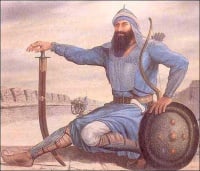Template:AOW111: Difference between revisions
Hari singh (talk | contribs) No edit summary |
Hari singh (talk | contribs) No edit summary |
||
| (8 intermediate revisions by the same user not shown) | |||
| Line 1: | Line 1: | ||
{{ | {{aowh2|Banda Singh Bahadur|Banda Singh Bahadur|birthday October 16}} | ||
{{p2|Image:Banda_Singh_Bahadur.jpg|'''[[Banda Singh Bahadur]]'''}} | |||
'''Baba Banda Singh Bahadur (1670-1716)''' (Lachhman Dev alias Madho dass Bairagi) , | '''[[Baba Banda Singh Bahadur]] ([[16 October]], [[1670]] - [[9 June]], [[1716]])''' (Lachhman Dev alias Madho dass Bairagi), originally from the [[Jammu]] region, is revered as one of the greatest [[Sikh]] warriors as well as a most hallowed martyrs of the [[Khalsa]] Army. | ||
Banda was born in a Minhas Rajput family on October 16, 1670 at Rajouri in the Jammu region of [[Jammu | The [[Khalsa]] were engaged in a prolonged fight against the cruel [[Mughal]]s, who were practising their tyranny and mass terrorism on the general public. | ||
His confrontation with the [[Mughal]] administration in Northern [[India]], though brief, was strong and extremely vigorous, enough to shake the foundations of this evil empire. | |||
The agrarian uprising that he led in the [[Punjab]] was the underpinning on which the [[Dal Khalsa]], the [[Sikh]] [[Misl]]s and [[Maharaja Ranjit Singh]] built the edifice which finally culminated with [[Ranjit Singh]] capturing [[Lahore]] in [[1799]] and establishing the [[Sikh Kingdom]] in the [[Punjab]] and finally the defeat of the cruel [[Mughal]] empire. This resulted in the end of a dark period in the history of [[India]].<!------- | |||
Banda was born in a Minhas Rajput family on '''[[October 16]], [[1670]]''' at Rajouri in the [[Jammu]] region of [[Jammu and Kashmir]]. He was named Lachman Dev. Wrestling, horseback riding, and hunting were his major hobbies. He was a very active and energetic child. However, as a young man, he shot a doe and was shocked to watch the mother and her aborted fawn writhing in pain and dying. After this gloomy scene, he had a change of heart. This experience moved him so much that the completely changed his outlook to life. He left his home and became a recluse. Soon, he met a Bairagi [[Sadhu]], Janaki Das an became his disciple.--------> {{aowf|Banda Singh Bahadur}} | |||
Latest revision as of 11:17, 16 October 2010
Baba Banda Singh Bahadur (16 October, 1670 - 9 June, 1716) (Lachhman Dev alias Madho dass Bairagi), originally from the Jammu region, is revered as one of the greatest Sikh warriors as well as a most hallowed martyrs of the Khalsa Army.
The Khalsa were engaged in a prolonged fight against the cruel Mughals, who were practising their tyranny and mass terrorism on the general public.
His confrontation with the Mughal administration in Northern India, though brief, was strong and extremely vigorous, enough to shake the foundations of this evil empire.
The agrarian uprising that he led in the Punjab was the underpinning on which the Dal Khalsa, the Sikh Misls and Maharaja Ranjit Singh built the edifice which finally culminated with Ranjit Singh capturing Lahore in 1799 and establishing the Sikh Kingdom in the Punjab and finally the defeat of the cruel Mughal empire. This resulted in the end of a dark period in the history of India. .....More

